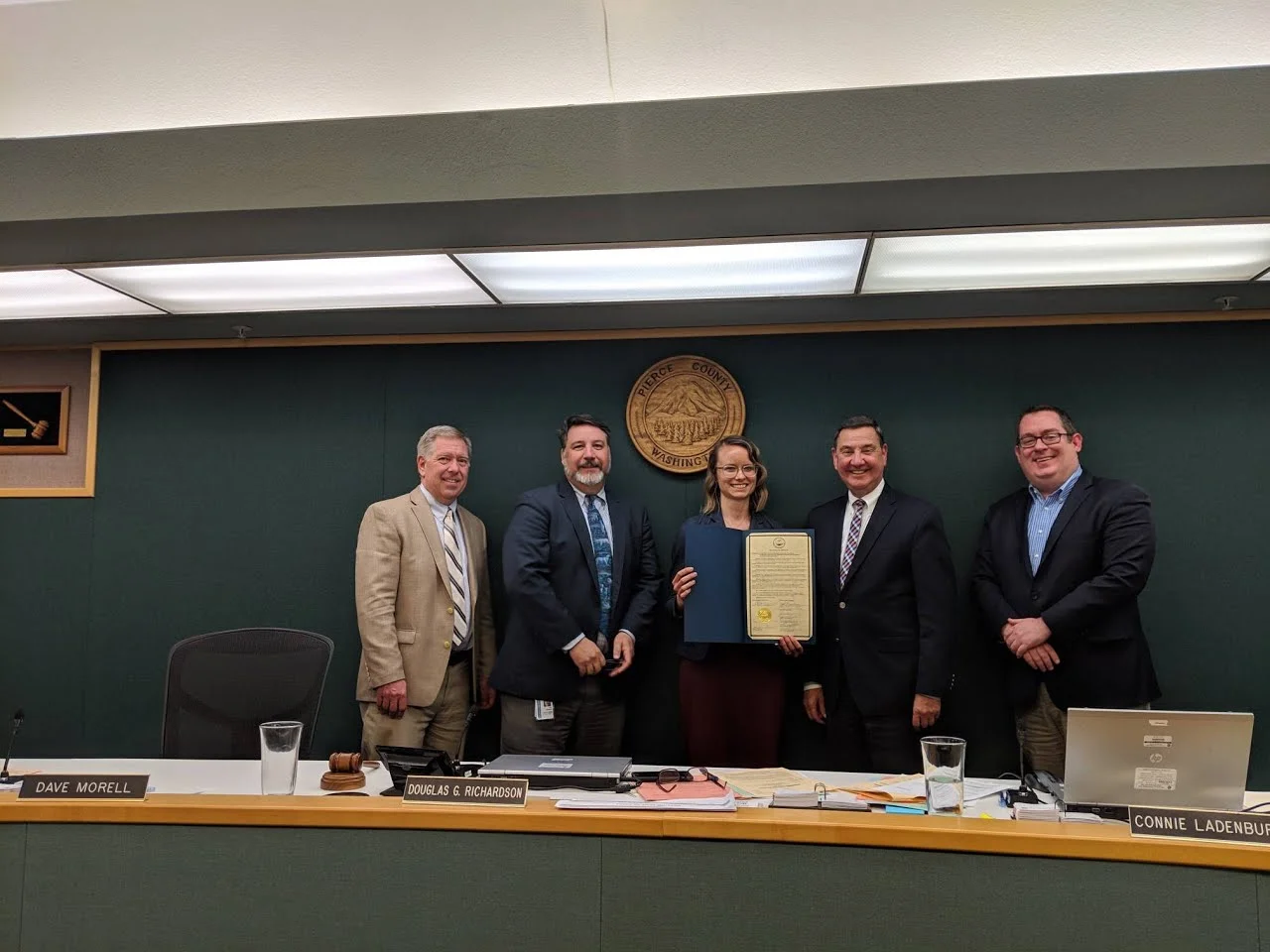Pierce County signs Birth-to-Three Resolution in April 2019.
When defining a prenatal-to-age-three system, there are a wide range of partners involved. We all play a role in impacting the lives of the young children and families around us. A prenatal-to-age-three system is not just the services that impact a child’s well-being in their first few years of life. It also includes the services that impact their parents’ lives, household income, physical environment, and the friends and relatives who surround a child. Connecting these supports together to collaborate on offering the wide range of services a family may need as their children grow – and improving the efficiency of the system as a whole – looks different in every community.
By bringing a diverse set of partners together with a shared vision, we know that progress is possible and outcomes for children can improve. In Pierce County, Washington, our community has a history of collaborating to solve problems together. In 2018, for example, a new 55,000-square-foot community center opened in Tacoma that traces its roots back to a teenager’s 2011 death to gun violence. Noting that there were few positive places in the area for teenagers to go, the victim’s mother, friends, and community members mobilized to raise money and advocate for the center to be built. Far more than a gym, the programming available at the Eastside Community Center was informed by community members and includes a training kitchen, recording studio, and coffee shop.
Our county’s current work to improve the system of support for infants and toddlers dates back to 2017, when juvenile court staff and community leaders noted the high numbers of young children entering foster care. With a quarter of foster care entries being children in their first year of life, we knew we had to move upstream to ensure families felt supported and could access the services they needed to keep their families stable. Together, local partners began a planning process for adapting the Help Me Grow model of connecting families to resources for our unique community’s needs. By promoting positive parenting information at the county level and offering a centralized access point for families to connect to resources for pregnancy and for children up to age five, the Help Me Grow Pierce County pilot project envisions a vibrant community where all families have the resources and confidence to support, protect, nurture, and dream for their children.
As a Pritzker Fellow through the National Collaborative for Infants and Toddlers, my role is to coordinate community partners working together to implement a system available to all families. With the limited capacity of child and family serving organizations to step away from their day to day work to collaborate on systems change, we know that the times we have together are precious. Participants in our community planning process have found value in learning from other organizations as well as knowing that they are contributing to building a system that will benefit families. To effectively bring different voices together to advance a shared agenda, acting as a convener has allowed me to consolidate our shared learnings and advocate for the community’s voice as a whole.
System building is not quick or easy work, but our county knew that before we could determine what services need to be expanded for young children and their families, we needed to make sure our existing community-based services were being fully utilized and supported. Families need an avenue such as a Centralized Access Point to be informed of all their options. By receiving expert information on a range of available resources such as prenatal care, housing, child care, early intervention, transportation, home visiting, parenting classes, and early literacy programs – just to name a few – parents can make the best possible decisions about what their families need, rather than connecting to the first resource they happen to hear about.
Being a system builder means I get to support all our community partners providing direct services, to learn from parent’s stories, and to coordinate our efforts for collective change. It means supporting the new mom suffering from postpartum anxiety, providing opportunities for parents to meet each other, and making sure families know that in our community you do not have to parent alone.
Most of all, I get to work every day for the infants and toddlers in my community who are born with similar potential but into very different circumstances. It is when we come together at this system level with our shared experiences and areas of expertise that local innovation happens. When we find new ways to learn together and coordinate the work we are already doing individually, we can make progress in ensuring that every baby born is healthy and supported.
Thirteen community leaders have been selected for the inaugural cohort of the Pritzker Fellows Program. The fellows, with expertise across fields of pediatric medicine, social work, child care and mental health services, were selected to lead their community’s unique efforts to advance policies and programs focused on increasing the availability of high quality programs and services for infants and toddlers. The Pritzker Fellows Program is part of the National Collaborative for Infants and Toddlers (NCIT). For more information, please visit www.thencit.org.


